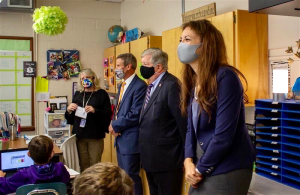House Votes to Confirm Local Islamophobe to Textbook Commission
/in Education, State, TOPICS, VIDEOS /by Justin KanewThe House just voted to confirm Laurie Cardoza-Moore to the Tennessee Textbook Commission per Speaker Sexton’s nomination.
Reminder that Cardoza-Moore:
– Said 30% of Muslims are terrorists
– Is a 9/11 truther
– Helped incite the insurrection
As Rep Gloria Johnson said, this is frightening.
Reps Harris and Mannis Push Back on TNGOP’s Anti-LGBTQ Textbook Ban
/in Civil Rights, Education, TOPICS, VIDEOS /by Justin Kanew“THIS WOULD ELIMINATE ME.” Reps Harris (D-Memphis) & Mannis (R-Knoxville) – the 2 out LGBT reps – push back on Griffey & the TNGOP’s ANTI-LGBTQ TEXTBOOK BAN.
It passed committee 8-7 (YES VOTES: Cepicky, Griffey, Haston, Hicks, Sparks, Warner, Moody, Weaver).
Sen. Akbari Grills Anti-Muslim Appointee to Textbook Committee
/in Education, State, TOPICS, VIDEOS /by Justin Kanew“I can’t think of someone more uniquely UNQUALIFIED. I am OFFENDED by this. We should ALL be INSULTED.” Senator Akbari grills Speaker Cameron Sexton’s lying anti-Muslim 9/11 truther textbook committee appointee Laurie Cardoza-Moore.
Email reps & say “NO MOORE”: https://secure.everyaction.com/t9yactsV6UmcEISF3Z_uVA2
“Nyquil and Tylenol” – Lee and Schwinn’s Learning Loss Nonsense
/in Education, State, TOPICS /by Justin Kanew“The point is that, whenever we propose a solution to a problem, we ought to try as hard as we can to overthrow our solution, rather than defend it. Few of us, unfortunately, practice this precept; but other people, fortunately, will supply the criticism for us if we fail to supply it ourselves.”
― Karl Popper, The Logic of Scientific Discovery
BY TC WEBER on “Dad Gone Wild.”
Nearly a decade ago, upon founding my think tank and beginning to release my white papers (tip of the hat to Peter Greene), I promised myself I wouldn’t write angry. And for the most part, I’ve stuck to that self promise. Though there have been times where I’ve been filled with self-righteous rage, feeling a burning desire to slam out a passionate missive, I have fought the desire and chosen to wait 24 hours to allow myself time to arrive at a bit more of a nuanced take. Till now.
These days I’m struggling a bit. Since the conclusion of the Tennessee General Assembly’s recent Special session, I find myself in a constant state of agitation. To be truthful, you should be as well. A big part of the problem is that the approved legislation was so sloppily written and hastily passed, that I continue to find new issues every time I look at it. Issues that serve to benefit adults more so than kids.
An added factor is the taking of what is supposedly a historic tragedy and offering a pedestrian solution. For months, Governor Lee and Commissioner Schwinn have been pedaling a narrative of dire consequences for the state’s children due to the pandemic using easily disputable data. According to Lee, “COVID-19 has disrupted every aspect of education and we are on the cusp of severe consequences for our students if we don’t act now.”
By now we are all familiar with his claims of 50% learning loss in ELA and 65% in math. If these numbers were true, they’d be cause for deep concern. I’d assume that Lee believes they are true. So it stands to reason that faced with such dire straights, he has some bold initiatives in hand. Surely if he’s calling a special session of the General Assembly to focus on education policy, they’ve already delved into the crisis and are ready to meet the unprecedented circumstances with unprecedented actions.
Nope, what we’ve got are summer schools and tutoring corps. Kinda like going to the doctor and having him tell you that you have COVID-19, and then prescribing Tylenol and NyQuil to treat it. Fine under normal circumstances, but damn, you’ve got a serious life-threatening illness. One that should call for a little more than previously utilized remedies that are readily available.
Worse than that, the more you look at the legislation that came out of the special session the more you recognize it as a series of bills slapped together like a bad batch of bathroom hootch. So bad, that apparently the Commissioner of Education Penny Schwinn herself isn’t quite sure what’s in them. When presenting the legislation to the State Board of Education members, she painted a picture of a series of plans designed to assist LEA’s, all fully optional and dependent on local decisions. That’s not the picture painted by a recent synopsis produced by the Tennessee Comptrollers’ office.
For example, go to the 1 hour and 12-minute mark of the aforementioned state board of education meeting and you’ll hear Ms. Schwinn clearly say, “districts do not have to retain a single child.” This was about the 3rd-grade retention rule in the recently passed policies. Arguably, she was arguing that there are several offerings in order to keep a child from being retained, but it also seems clear that Ms. Schwinn was downplaying the threat of retention. The video is full of similar instances of soft-peddling.
I’m not the only one picking up on the problems with the bills. Over at the TNEd Report, Andy Spears reports on push back by the Germantown School Board. The school board takes exception to the 80% TNReady participation required to avoid negative consequences as a result of student testing. In their eyes, the legislation provides the commissioner with the power to grant waivers but fails to provide requirements for earning those waivers. They are rightfully concerned that with a large percentage of students remaining virtual, they will have a hard time meeting that threshold.
Here’s the big picture, Tennessee’s legislators have codified a power to the Commissioner concerning something that she hasn’t been granted a federal waiver to implement. Federal legislation says that districts are required to test 95% of students. Many states are applying for a waiver to not conduct standardized testing at all this year. Tennessee isn’t one of them, we are asking for a waiver to only require districts to test 80%of eligible students. A waiver that has yet to be granted, despite Schwinn’s assurances that a cousin of a friend who has a sister who works in a coffee shop outside the DOE offices in Washington thinks that this is aligned with the thinking at the newly staffed USDOE. This is despite Biden’s pick for Secretary of Education, Miguel Cardona, still awaiting confirmation.
It’s a pretty presumptuous move considering that Cardona has sent mixed signals on how he’ll address standardized testing this year. Per Chalkbeat,
“If the conditions under COVID-19 prevent a student from being in school in person, I don’t think we need to be bringing students in just to test them,” he said. At the same time, he said getting a gauge of student learning is important. “If we don’t assess where our students are and their level of performance, it’s going to be difficult for us to provide targeted support.”
A bigger question would be, why are we even administering standardized tests at all this year? Across the state of Tennessee, students have faced a wide array of educational options this year. Some have been exclusively remote, while some have received mainly live instruction. Others its been a mixed set of options. Some families have been severely impacted by COVID, while others remain mostly unscathed. The bottom line is that everyone is doing their best to navigate the ongoing crisis with varying degrees of success. As such, time spent testing would be better spent helping kids adjust to their circumstances and continuing instructional efforts. The Education Trust and several allies disagree.
The national non-profit education advocacy group, headed up locally by MNPS school board member Gini Pupo-Walker, have sent a joint letter to the USDOE urging them to not grant any testing waivers. Citing a report by McKinsey and Company – yes, the opioid folks – they claim,
These factors have cost students, by some estimates, an average of seven months of learning, with a disparate impact of nine months for Latino students and 10 months for Black students. The projected impact of interrupted learning for students from low-income backgrounds is more than a year.1 Perhaps even more concerning, as many as 3 million students are still missing from school.2
Besides the obvious, that “months of learning” is a bullshit number that assumes all kids learn at the same rate, the letter paints a picture of schools not having a clear idea of where students are after nearly a year of interruption due to the COVID-19 crisis. It’s a picture shared by Commissioner Schwinn and Governor Lee as well. It’s also inaccurate.
What everyone fails to tell you is that we have already tested the heck out of kids. Since arriving back from Winter Break, my 5th grader and my 6th grader have already been subjected to the second round of Math and ELA testing with both MAP and IReady. EL students are now starting on WIDA testing. Tennessee’s RTI legislation requires schools to use a screener three times a year. So to act as if we don’t know where students are at this juncture is a little disingenuous. As is the inference that by administrating the BIG TEST, three million students are going to come running back to schools. Both are myths crafted to fuel adult agendas.
Let me tell you what is more likely to happen. The state does not have access this year to individual LEA’s student data from local tests, which changes next year. Therefore they need the results from the BIG TEST. I know they said that this year is a hold harmless year, but that doesn’t mean that results can’t be used in order to support the TNDOE’s narrative of failure. I’m sure that over the summer there will be a great clutching of pearls and rendering of garments over the sad state of Tennessee’s schoolchildren based on results from a test given in the midst of a pandemic. Legislators and bureaucrats will sprain their arms patting each other on the back about their great foresight in passing legislation to combat the dire straits our children now find themselves in.
That’s not to say that summer camp and tutoring can be beneficial to kids. research has shown under the right conditions, both have proven beneficial. However, for many kids, it is not going to be enough. They, unfortunately, require so much more, some of which fall outside of the purview of the classroom. Those kids will, per usual, be left to their own devices, because serving them would actually require some boldness and forethought. It would also require addressing poverty issues, which we are always loathed to do. Well, maybe we’ll give them a voucher, then we won’t have to worry about them.
There is another group of kids – “Bubble Kids” – that are very useful for politicians and their ilk. These are the kids that sit just below the “on-track” level. The ones who, with just a little bit of extra attention can be pushed over the line and claimed as a success story. Now before you recoil in horror, rest assured, I’m just making this up. It’s been an unspoken practice in the past and there is no reason to think it won’t be in the future. Especially when a man is running for re-election and needs some positive states.
Here’s, for further explanation, is an excerpt from a piece written in 2005,
So the bubble kids are identified, divided into groups, and tutored relentlessly. The kids who missed by 5 or 6 points, maybe 10 points; what happens to them. It’s simple. They cant raise their scores enough to help the schools rating, so they are ignored. Why would you waste your time with them the school thinks, they can’t help us. They don’t get intense help with their work. After all, don’t you know, they won’t ever pass anyway. Why waste valuable tutoring time on them? Of course, what a brilliant idea – work with the kids who can make you look good and throw the others to the sharks. I truely wish I knew which of our administrative geniuses brought that obscene idea into the district. Thats Sheldon Independent School District, always go for the easy stupid solution instead of the complex one that would require planning, actual thought, listening to teachers, or giving a care.
Lest we forget, tutoring and summer school are not new. The new legislation proposes 1:1 tutoring levels for kids. Where are those tutors supposed to come from? And if they are truly out there why have we not identified them in the past? How many people will sign up to be a tutor, collect their per diem to go through training, and then bail when they realize that it’s a lot more difficult than they imagined?
Tennessee established a successful summer program back in 2016 with the Read to Be Ready initiative. The program proved effective and popular with local school districts. But since they were initiatives of the previous Governor and not products of Schwinn and Lee’s tenure, they were left to wither, along with the network of literacy specialists when funding was left to dry up. Lee and his commissioner chose instead to focus on voucher legislation, which is still tied up in court.
Reading about the program in a past edition of Chalkbeat can evoke a clear sense of missed opportunity,
And what began with 12 summer reading camps in the program’s inaugural year — through a $1 million gift from the Dollar General Literacy Foundation — had grown tenfold by the second year, thanks in large part to a federal DHS grant. Last summer, more than 7,700 children who are mostly economically disadvantaged took part in 250 reading camps across the state, and more than 193,000 high-quality books were given to the students to take home. Even more camps are underway this summer via an $8.9 million grant program.
According to a report released last fall, first-, second-, and third-graders who participated in the camps showed gains in reading comprehension and accuracy skills for a third straight year. And the last two summers generated statistically significant improvements in those skills, based on assessments given in the early and last days of the camps.
Despite recent evidence, nobody called, “Bullshit,” when special session legislation was rolled out. Nobody pointed out that previously camps were funded at a 1:16 ratio of teachers/students in the past and that under the new legislation, despite being flush with federal dollars, it would be 1:20. Questions were raised about adequate funding, but just as quickly dismissed. The reality is that this year’s legislation fails to provide adequate funding for districts to open their buildings in the summer months.
It was no different with the bill granting raises to teachers. $120 million sounds great unless you do the math. Teachers may have been promised a 4% raise, but all one has to do is read the Comptrollers report to get a clear understanding that Tennessee’s teachers shouldn’t be planning any big purchases shortly.
The additional funding may be used to support salary increases for certified staff as well as school nurses. Flexibility within the appropriations language allows districts to determine how to distribute the additional funds, such as through salary increases or bonuses. The increase is generally based on the number of positions calculated for each district in the instructional salary category of the BEP. In FY 2021, the BEP funded approximately 66,241 licensed instructional positions; school districts employed 77,704 instructional personnel in 2018-19, the latest year of data available.
Once again, politicians get a blurb for their palm cards, while teachers are left with an empty bag. But nobody says anything. Teachers say nothing because they’ve become accustomed to empty promises from legislators and as a result tune out the words before they even leave the mouths of legislators. Others are too concerned about losing access or their seat at the table. Don’t want to make anyone mad, or you’ll lose your staus. And so once again, another session passes with teachers falling economically further behind.
Right now in D.C., there is a lot of talk about the death of Democracy. Nothing will destroy democracy faster than enabling politicians to continually craft bad laws unchallenged. While we all fight to preserve our seat at the table, the table continually shrinks, until it reaches a point where all the power is consolidated in a few hands. Hands that work to exclude all that disagree.
Representative Cerpicky from Maury County is this year’s Chair of the House’s Education-Instruction subcommittee. This week he held his first committee meeting. He began proceedings, by stating the purpose of the committee. In his words,
“We are here to be child-centered. To be student-centered. We are not here to protect the status quo ore the system. Except for the parts of that system that succeed in putting the success of our children first. We are not here for the comfort of adults, but for the opportunities for excellence, advancement, and ultimately to be advocates and essential stewards of the individual independence afforded by an excellent education.
How are the citizens of a Republic to be be free without the ability to look after themselves and participate as critical thinkers in this work of self-governance?”
They are beautiful words. Heartfelt words. Inspiring words. I hope that is not all they are. Otherwise, we are going to need a whole lot more than NyQuil and Tylenol.
QUICK HITS
This week Senate Education Committee Chair Brian Kelsey launched another attack on Shelby County Schools for not opening school buildings. Kelsey is supporting a bill that would give the Governor executive powers to open/close school districts. The fight is part of a much larger battle going on nationwide over urban districts opening school buildings. It’s a discussion devoid of nuance. Keeanga-Yamahtta-Taylor adds some of that nuance in a recent New Yorker piece.
Chicago public schools are only eleven per cent white; Black and Latinx students make up eighty-one per cent of the student body. Unsurprisingly, white students are overrepresented among those opting for in-person learning, and also those who are actually showing up to school. Since early January, there has been a phased-in return to public-school buildings, beginning with preschool and special-education students, with the next phase bringing back kids in kindergarten through eighth grade. Among C.P.S. elementary-school students, only thirty-one per cent of Latinx students, thirty-three per cent of Asian students, and thirty-four per cent of Black students were opted to return to school buildings by their parents. In contrast, the parents of more than sixty-seven per cent of white children opted them in.
Taylor goes on to show that just because schools are open, does not mean that students are showing up. I strongly encourage you to read the whole piece.
It’s good to know that I’m not the only one noticing how inadequate the TDOE’s READ 360 is. Today national writer Nancy Baily takes it apart. She rightfully questions Tennessee’s stated goal of “accelerating learning”. Pointing out that,
Accelerating learning seems to be an obsession among some policymakers, and it’s hard to understand. What possible good comes from forcing children to learn fast? Why are states still trying to make students race to some obscure finish line? How many children will end up with learning problems because of it?
Tru dat. read it all, you won’t be sorry.
At least one Tennessee lawmaker seems to have some common sense. Lt. Governor Randy McNally is quoted in today’s Tennessean as observing that, “Whatever we do will probably be reviewed by the federal government and they can cut funding to the state,” he said. “It’s an issue I think that we need to move very carefully.” His comments are in stark contrast to those of Governor Lee who 2 days ago made the claim that ‘transgenders participating in women’s sports will destroy women’s sports,” he told reporters. “It will ruin the opportunity for girls to earn scholarships. It will put a glass ceiling back over women that hasn’t been there.” In a ludicrous that is predicated on a large number of transgender athletes looking to participate in woman’s sports and a larger number of college programs willing to by-pass female athletes for college scholarships. To date, there is evidence of neither.
Congratulations to former MNPS principal Darwin Mason on his being named as Ensworth’ss new Head of Middle School for the 2021-2022 school year! Well done. Ensworth conducted a Nashville search before finding their man right here in their back yard.
Note to leaders. Creating an advisory cabinet of teachers, principals, or superintendents, is not sufficient. You have to actually listen to them. Otherwise, you might as well not form an advisory cabinet. Just saying.
We are slow in offering this, but we still want to offer our condolences to former MNEA President Eric Huth. Eric lost his son a couple of weeks ago. No parent should ever have to bury their own child, and our heart goes out to him.
If you’ve got time and are looking for a smile, check out the Dad Gone Wild Facebook page, where we work to accentuate the positive. We’ve started to include more pictures of kids returning to buildings.
If you’ve got something you’d like me to highlight and share, send it on to [email protected]. Any wisdom or criticism you’d like to share is always welcome.
A huge shout out to all of you who’ve lent your financial support. I am eternally grateful for your generosity. It allows me to keep doing what I do and without you, I would have been forced to quit long ago. It is truly appreciated and keeps the bill collectors happy. Now more than ever your continued support is vital.
If you are interested, I’m now sharing posts via email through Substack. This is a new foray for me and an effort to increase coverage. ‘ll be offering free and paid subscriptions. Paid subscriptions will receive additional materials as they become available. We’ll see how it goes.
If you wish to join the rank of donors, you can still head over to Patreon and help a brother out. Or you can hit up my Venmo account which is Thomas-Weber-10. I don’t need much – even $5 would help – but if you think what I do has value, a little help is always greatly appreciated, especially this time of year when my contracted work is a little slow. Not begging, just saying.
The Burden of Proof
/in Education, State, TOPICS /by Justin Kanew“Whoever is careless with the truth in small matters cannot be trusted with important matters” ― Albert Einstein
BY TC WEBER on “Dad Gone Wild.”
Two days ago the Tennessean ran an article reporting that MNPS had received a letter from the Commissioner of Education accusing them of fiscal malfeasance regarding their management of federal funds delivered through the CARES Act. In the commissioner’s words,
“I cannot underscore enough the seriousness of the current financial management of federal funds and compliance issues in MNPS,” Schwinn wrote Monday. “It is imperative that these issues be resolved quickly, accurately, and comprehensively, so as to provide students with the resources that they need and to move the district to a space of compliance with federal and state law.”
Yikes, dems are some strong words. Department spokesman Victoria Robinson followed up with strong words of her own,
“The issues addressed in the letter represent systemic financial and programmatic concerns documented by multiple oversight agencies at both state and federal levels over multiple years,
Governor Lee’s spokesman Laine Arnold piled on,
“When student achievement, teacher compensation and all manner of public education issues are blamed on lack of funding, $110 million sitting idly by is not acceptable for Nashville families,”
Apparently, things are a little slow in Memphis because Representative Mark White felt the need to offer his two cents,
“Unless we have accountability from these school districts, we can’t keep throwing money at them if we don’t see improvement,” said Rep. Mark White, R-Memphis,
As the basis for their criticism, several references were made to a recent audit put forth by the comptroller’s office. Per Schwinn,
“Within 45 days, the district must also remedy findings from a recent comptroller’s audit.”
Being the crazy guy that I am, I decided to read the comptroller’s report to get an idea of the severity of the issues. After spending 30 minutes on the state website and being unable to locate the said report, I called the comptroller, where I was promptly informed that the reason I couldn’t locate the report was that the report wasn’t yet available. It wouldn’t be available until…March. In fact, the comptroller’s office was still in the process of constructing the report.
Some of you may be unfamiliar with how the audit process works. Once the subject of the audit is defined, a field team is sent out to investigate. They compile data and notes. These findings are preliminarily shared internally to possibly get more clarity. All involved are allowed to offer a rebuttal to any findings. After the rebuttals are submitted the report is compiled and only then is released with the stamp of approval from the comptroller’s office. It is an arduous and rigorous undertaking.
Per the comptroller, the field investigation into MNPS spending has just recently been concluded. Speculation, that affords a generous amount of grace, is that Schwinn saw some irregularities in the preliminary findings, conducted her own investigations, maybe substantiated those initial suspicions, and then dashed off her letter. How extensive an investigation the DOE could have completed is questionable, as the impression I got from the comptroller’s office was that fieldwork had just been completed in the last few weeks.
I reached out to Victoria Robinson, TDOE spokeswoman, and asked if I could see the report that TDOE generated to support their allegations or at least the notes connected to the investigation. As of now, I’ve yet to hear a response and if history with this administration holds true, I likely won’t see a response until mid-July or August. Regardless of her reply, the facts still hold true, Governor Lee and Penny Schwinn, are attempting to punish MNPS while citing a report that does not exist. And based on their interference may never exist. The whole thing smells like a plot cooked up over Happy Hour at the Capital Grill.
The bigger issue is that it makes others complicit in the Schwinigans. The comptroller’s office prides itself on its non-partisanship – just the facts mam. With Lee and Schwinn, citing a report that is still under construction, that mission in this instance is possibly tainted.
Will the writers find themselves under pressure to craft a report that backs the Governor up in an effort not to embarrass him, or do they try and be kind to MNPS because perhaps they have kids in the system? Either way, the impartiality of the report is tainted. People’s motives will likely come in to question through no fault of their own, but rather due to the selfishness of the two bureaucrats.
That’s a loss for all of us because, in order to have a functioning society, there has to faith in the impartiality of our democratic institutions. The comptroller’s office, like the Supreme Court, is a key component in our democratic structure and as such, should never be carelessly used for political fodder.
If this was the first occurrence of such behavior by Governor Lee and Commissioner Schwinn it would still be disturbing, but defensible. The problem is, it’s not. It is just another instance, in a lengthy list of instances, of deception perpetrated by the bumbling duo.
 Think back to August when the two put forth the idea that due to the pandemic, students were facing learning losses of 50% in ELA and 65% in math. When pressed to supply data to back up these suppositions, they just created a cloud of confusion, while failing to produce confirmation. The inability to substantiate their claims is because “learning loss” is a political construct and not a real measurement. Currently, no assessment measures learning loss. We can measure performance levels, and growth, but not “learning loss.” Anything put forth under that banner should be considered pure speculation and subject to personal desires.
Think back to August when the two put forth the idea that due to the pandemic, students were facing learning losses of 50% in ELA and 65% in math. When pressed to supply data to back up these suppositions, they just created a cloud of confusion, while failing to produce confirmation. The inability to substantiate their claims is because “learning loss” is a political construct and not a real measurement. Currently, no assessment measures learning loss. We can measure performance levels, and growth, but not “learning loss.” Anything put forth under that banner should be considered pure speculation and subject to personal desires.
Fortunately for the dynamic duo, nobody really delved into their claims. So they were free to continue to spout their falsehoods, and they did at every opportunity. Sure there was some mention that some people “questioned” the numbers, but most media outlets and politicians continued to talk about “learning loss” as if it was carved on tablets from Mount Sinai. Until this week, when Memphis television station WMC5 started digging into Schwinn and Lee’s claims. What they found, is that they didn’t hold water.
Despite new data suggesting COVID-19 learning loss wasn’t as severe as predicted, state leaders continue to use old data, which some have called misleading, to pressure school districts like Shelby County Schools to reopen for in-person classes.
Once again, a political agenda took precedence over accuracy. We now know that Lee along with Schwinn pulled the numbers out of their ass. A crass accusation, but due to the depth of their deception, a necessary one.
As a nation, we’ve just emerged from a deep conversation about the importance of leaders being truthful, and the potential of dire consequences when our elected leaders fail to adhere to that standard. Throughout their tenure, both Lee and Schwinn have continually acted in a manner that pays little heed to accuracy and honesty. Instead of choosing to pick and choose nuggets to use to make their arguments independent of their veracity.
 It’s a pattern of evidence that includes an ever-growing list of instances. From the wasting of taxpayer money by inventing a costly excuse to avoid meeting with the US Secretary of Education to offering testimony to the head of the state’s Senate Education Committee, that she hasn’t met with vendors over a pending RFP despite video evidence to the contrary available on the department website, Schwinn and company continue to abuse the trust of Tennessee taxpayers through their machinations of the truth. Schwinn achieves new heights in the use of doublespeak. At one point during her recent special session testimony, education experts pondered whether she was actually using real words describing real circumstances.
It’s a pattern of evidence that includes an ever-growing list of instances. From the wasting of taxpayer money by inventing a costly excuse to avoid meeting with the US Secretary of Education to offering testimony to the head of the state’s Senate Education Committee, that she hasn’t met with vendors over a pending RFP despite video evidence to the contrary available on the department website, Schwinn and company continue to abuse the trust of Tennessee taxpayers through their machinations of the truth. Schwinn achieves new heights in the use of doublespeak. At one point during her recent special session testimony, education experts pondered whether she was actually using real words describing real circumstances.
Other instances include a willingness to receive a six-figure paycheck as Executive Director from a state-funded charter school for impoverished children in California while collecting a paycheck as a senior state official across the country in Delaware. As well as recently claiming in Senate hearings during a special session of the Tennessee General Assembly that the department will create an ELA screener that adheres to Tennessee state standards and is nationally normed. Something that is impossible to create.
Political insiders on both sides of the aisle have long marveled at Ms. Schwinn’s ability to contradict herself regularly in testimony to the General Assembly. So much so that at a Senate Education Committee meeting last Spring, where the Commissioner was slated to testify, the chair felt compelled to take the virtually unprecedented action of having the rules of perjury read before opening proceedings. You didn’t think that was just a coincidence, did you?
If MNPS is not properly spending or accounting for federal resources, they should be held accountable. But the accusations should be derived from existing transparently created documents that support the allegations. Not some half baked assumptions pulled from a collection of data still being compiled. Documents that in their completed form, should be used in a manner that protects the interests of kids, not in a manner that further the agenda of adults.
The truth matters. Being able to believe the words of our leaders is essential. At some point, the question has to be raised, does the Commissioner model behavior that we want to be emulated by the state’s children? Does the Governor? Not to be an ass, but currently, there is a whole lot of talk about christ around the statehouse, and a decided lack of Christian behavior. Somebody might want to work on that.
The Tennessee Department of Education currently is seeking submissions for a contract to construct a state-wide course on civics, one designed to help develop students into better citizens. It will ultimately be overseen by one person who has engaged in bully tactics – that report does exist – and another who suffers from the inability to separate fact from personal interest. That’s a scary proposition. Maybe I’m a bit of a square, but as a parent, while I aspire to be my children’s’ role model, I also want them to be able to look to the country’s leaders for evidence that doing the right thing matters. That leaders are people of character.
Based on his long history of working with those less fortunate than himself, I was under the impression the Governor felt the same way. I just haven’t seen a lot of evidence to support that assumption as of late.
Education doesn’t begin and end in the classroom. we are all works in progress and we all create the rules that govern our society. In order to create a society that works for all of us, it has to be rooted in truth and honesty. That starts with all of us and it shouldn’t be too much to ask that before we make accusations we make sure they rise to the challenge of meeting the burden of proof.
Conservative writer and Delaware State School board member Andy Smarick sums it up better than I,
When most leaders implicitly trust institutions and then work through them, the decisions of those institutions are generally understood as legitimate. But those institutions become even more trustworthy when their processes and outcomes are scrutinized and deemed to be fair. Said another way, good institutions aren’t merely trustworthy because they are reflexively trusted; they are trustworthy when they behave in ways worthy of trust.
QUICK HITS
Last night the MNPS School Board engaged in some discussion about the reopening of school buildings. It was reiterated that for that to happen, the district’s COVID-19 tracker would have to drop below 7. Today it rests at 7.7.
Even as the conversation around re-opening schools flares up in Nashville, it continues to grow nationwide as well. Lack of in-person learning is a challenge faced by all large urban districts. It’s a discussion that has wreaked havoc in communities and created division among former allies. Per an article in the Intelligencer,
On social media, everyone was an amateur epidemiologist. Commenters tore Fry apart, accusing her of misreading the data, underestimating the unknown menace of the virus. Some of the most vehement attacks came from commenters who identified themselves as teachers. “I couldn’t believe it,” Fry said. “I was arguing with teachers about the importance of education.”
The arguments got mean. The holdouts called reopeners selfish, lazy, and cavalier — willing to sacrifice lives for child care. “I still get called a granny killer,” says Maya Ziobro, a parent who supports reopening. “If we say anything about wanting our kids to return to school, we’re painted as Trumpers.”
“I’ve never been on the other side of the teachers union in my entire life,” Fry said. “I’m afraid of the long-term damage this is going to do between teachers and parents, because people think that their kids are suffering, and it makes it hard to sympathize with the union struggle.”
Much of what is outlined in the article is uncomfortably familiar to what’s happening in Nashville. Hopefully, some cooler heads will soon prevail and kids can safely return to school buildings. But the latter shouldn’t happen till the former is secured. No matter what side of the argument you find yourself on, I urge you to read the whole article. It’s long but well worth it.
Education writer, and professional educator, Peter Greene shares his list of education writers worthy of reading and it’s worth sharing. Yours truly is extremely proud to be included in his roll call.
TC Weber covers Tennessee thoroughly and with sharp wit and pithy quotes. “Nobody reads it. Everybody quotes it.”
Bookmark him and the rest of the list, you’ll be better for it.
Bill Lee may not like to talk to Tennessee reporters, but yesterday he set down with the Washington Examiner where he made the erroneous claim that only 2 districts in Tennessee remained all-virtual. Apparently, he doesn’t read his COVID tracker either. For the record, as of last week, 13 of Tennessee’s districts were still virtual. One in fact remains closed, Kingsport. Below is the list of those remaining remote, with the names of those local representatives who supported a bill forcing schools open in parenthesis.
It is Nashville and Memphis. And we’re actually working on that issue right now. We had a special session last week that I called for our legislature to address learning loss and to address accountability, really testing, learning loss, how we’re going to address the challenges to education going forward. And when people were railing at me for opening schools because kids were going to die in the school buildings, and we did it anyway because the science didn’t indicate that, and certainly, it hasn’t happened.
So, we’ve been open in-person for the most part since school opened in August. And we are pushing the large districts to open as well because we think that’s really important. Pressure is a very important component here. That’s the reason I got up and really just called those school districts out publicly because here’s the thing: Parents want their kids to be at school. And the saddest part from my perspective is that Memphis is the biggest school district that we have. It also has the most number of low-income children who get the greatest negative impacts from being out of the classroom. I mean, these are the kids that have the least access to technology. They have the least resources, the family structures, oftentimes — they’re not there to support the needs of them. And so, these are the kids that are sitting at home, and the negative impacts on these children is staggering. Calling that out, publicly talking about why parents want their kids to be in school, has already begun.
Hmmmmm…fortunately Memphis is not rolling over for this egregious attack and have already mounted their counter-attack.
This is a good place to stop for today.
If you’ve got time and are looking for a smile, check out the Dad Gone Wild Facebook page, where we work to accentuate the positive.
If you’ve got something you’d like me to highlight and share, send it on to [email protected]. Any wisdom or criticism you’d like to share is always welcome.
A huge shout out to all of you who’ve lent your financial support. I am eternally grateful for your generosity. It allows me to keep doing what I do and without you, I would have been forced to quit long ago. It is truly appreciated and keeps the bill collectors happy. Now more than ever your continued support is vital.
If you are interested, I’m now sharing posts via email through Substack. This is a new foray for me and an effort to increase coverage. ‘ll be offering free and paid subscriptions. Paid subscriptions will receive additional materials as they become available. We’ll see how it goes.
If you wish to join the rank of donors, you can still head over to Patreon and help a brother out. Or you can hit up my Venmo account which is Thomas-Weber-10. I don’t need much – even $5 would help – but if you think what I do has value, a little help is always greatly appreciated, especially this time of year when my contracted work is a little slow. Not begging, just saying.
“We are Creating a High Stakes Test for 8-Year-Olds”
/in Education, State, TOPICS, VIDEOS /by Justin KanewRep. Yarbro raises serious concerns about HB7004, a rushed education bill that isn’t properly funded and was passed without hearing testimonial from a single educator.
Change Tennessee’s “F in Funding” for Education
/in Democrats, Education, State, TOPICS, VIDEOS /by Justin KanewFOLLOW THE MONEY – Rep. Bo Mitchell sounds the alarm on the literacy bill steering money to companies. He tells Rep. Cepicky if he wants Tennessee to move from the bottom to “#1 in education” that we need to “Change our F in Funding.”
The Lesson Is, Elections Matter
/in Education, Health Care, State, TOPICS /by Justin Kanew“Scripture tells us to envision that everyone shall sit under their own vine and fig tree and no one shall make them afraid.” – Amanda Gorman
BY TC WEBER on “Dad Gone Wild.”
Elections have consequences – it’s a phrase most of us are familiar with. Currently, it’s a trope on full display in Tennessee where legislators have passed major bills on education and healthcare in the first few weeks of the new year.
Regarding the latter, members of the General Assembly raced to rush through a block grant authorization that would make Tennessee the first state in the union to receive federal Medicaid funds in one lump zoom. The impetus for the quick action wasn’t born out of a desire to serve Tennessee citizens, but rather out of a recognition that on January 20th Joe Biden would become president and likely rescind the grant awarded in the waning days of the Trump presidency. In other words, they were serving the needs of politicians, not citizens.
Yesterday, as a special session designed to pass Governor Lee’s favored initiative successfully wrapped up, politics were once again front and center. All of the proposed legislation was passed into law without testimony from a single one of the state’s educators and over the protestations of one of Tennessee’s most respected superintendents. Despite my deep disappointment over legislation that clearly benefits the friends and family of Governor Lee and Commissioner Schwinn over the state’s children, I recognize that the outcome was never really in doubt.
Tennessee is a state with a GOP supermajority with an unstated desire not to embarrass the Governor, a fellow Republican. And not passing his favored legislation during a special session called by him, would certainly serve as an embarrassment at a time when the GOP doesn’t any more embarrassments or signs of discord. As a result, some good people were put in a position of promoting bad policy and passing bad laws.
Few legislators have worked harder over the last two years on education than Maury County Representative Scott Cepicky. The Rep has dived deep into education issues, talking with a variety of stakeholders to truly understand the issues facing the state’s school. He’s been receptive to input, even when the information countered his preconceived notions, yet here he was touting legislation that couldn’t possibly be supported by this personal research, let alone that of education experts.
Legislation that proposed, among other things, to retain third-graders who fell short on state tests, inadequately fund a tutoring force, grant extended powers to an education department that can charitably be described as inept, along with passing a raise for teachers that does little but create campaign slogans for politicians. You see the 4% raise, as it was pointed out in Committee, is not a raise for teachers, but rather a one for the BEP funding line that is intended for teachers.
Unfortunately, the BEP funding doesn’t adequately cover all the teachers that districts need to hire to meet mandates. The BEP formula may cover 10 teachers, while the LEA hires 15 to meet the needs of their students. As a result, the allotment meant to cover 10 teachers must be spread out to cover the 15 with local funds required to make up the shortfall. In the case of MNPS, estimates put the proposed 4% raise as being in actuality around 1.5%. An amount that translates, if earning 50K annually, to about $750 annually before taxes. Assuming taxes take at least 15%, that leaves roughly 600 to be divided up over a year of paychecks. Raise your hand if you feel that is an adequate representation of the number of extra hours teachers have contributed this year.
As a result of this proposed increase, large urban districts will be left scrambling to find extra funds in order to even attempt to reward teachers in a manner they’ve earned. But the poison financial pills in these bills don’t end there.
In the past, districts selected the curriculum they would use to best teach their students off of an approved materials list. Legislators recognized the costs of materials and allowed for districts to adopt but not purchase. Contrary to Ms. Schwinn’s testimony, failure to purchase was usually a result of funding and not an effort to circumvent the process. Thanks to the bills that passed yesterday, districts will no longer have that leeway and will be forced to purchase all materials adopted. It’ll be up to Schwinn and posse to decide who can afford what.
Starting immediately, LEAs will be required to submit a plan for approval to the department of education outlining their k-5 early literacy instruction plan using materials off of the state’s approved list, unless granted a waiver. Remember, during the recently completed ELA textbook adoption process the DOE approved over 70 waivers for districts to adopt materials of favored vendors not on the approved for adoption list. Roughly half of the state’s LEAs are now using materials not approved by the Tennessee Textbook Adoption process, and some would argue that the number is much higher due to the actions of the DOE. This is who we’ve granted even more power to. The sad part is, most of Tennessee’s legislators are well versed in the commissioner’s machinations, yet decided to turn a deaf ear out of deference to the Governor.
LEAs better start looking for some more funding for tutors and summer schools as well. Discussions in the finance committee revealed that for summer school, each classroom will be afforded $1400 to cover expenses including busing costs, most of which will be eaten up by teacher salaries. As explained by commissioner Schwinn, most larger districts will benefit from the economics of scale. They’ll have numerous classes in each grade level from which to draw money to cover all costs. Smaller districts won’t be so lucky, and by all accounts, the $400 per class won’t even begin to cover associated costs.
It was also revealed in Finance that districts will be required to cover half the costs of tutoring services that will be required to prevent 3rd-grade retention. In smaller districts that may not represent a significant cost, but for large districts it could be quite significant.
For me, the most troubling revelation of the day was that we fund after school programs, and propose to fund future tutoring programs, summer school, and after school camps, out of a fund that is created by lottery winnings that go unclaimed. A revenue stream that varies greatly from year to year, last year it was $6 million, the year before 2, and before that 3.
Try this exercise, Tell your banker that you plan to refinance your house and that you’ll be making payments with change found in your couch. What do you think, 3…4 seconds before you are laughed out of their office? But no one was laughing in the General Assembly. They felt it was a perfectly stable revenue stream, even when under questioning the current level of after-school funding wasn’t available.
For me, the most valuable thing that happened during Special Session was when Commissioner Schwinn testified before the Senate that 3rd-grade TNReady wasn’t a reading test but rather a measurement of knowledge of Tennessee ELA standards. Think about the significance of that for a minute, the Commissioner regularly makes commentary on the skill level of Tennessee students based on data that is derived from an assessment that she publicly acknowledges doesn’t assess reading. Yesterday, Portland Representative William Lambreth lectured fellow House members to follow the “science” when it comes to COVID, yet he fails to apply the same standard when it comes to education issues.
Allow me to digress here, and be blunt for a minute. During yesterday’s proceeding Lambreth behaved in session in a manner we Tennesseans like to call “showing your ass”, as in, “man he really showed his as”. For those unfamiliar with the term, it loosely translates into behaving in an unflattering or embarrassing manner.
On Wednesday during an exchange with Rep Mitchell, Lamberth behaved in a manner that reflected his status as a senior member of the House’s leadership team. He came off as a gentleman and somebody who did their homework. On Thursday, it was the opposite. In response to Mitchell’s legitimate concerns around the proposed legislation, he resorted to behavior that more closely resembled that of a schoolyard bully.
He was demeaning and belligerent to both Mitchell and those who have legitimate concerns about the dangers of COVID. Despite expressing an unwillingness to debate the effects of the pandemic, he brought forth materials that he had clearly carried with him in hopes that such a debate would arise. Materials that while arguing for the safety of opening schools also carried the caveat that schools were safe as long as community spread wasn’t exceedingly high. Later he blasted anyone who dared question whether the funding designated for the bills would be significant,
“Not only is there not an unfunded mandate, we have funded it well above anything we did last year,” Lamberth said. “Our kids don’t know how to read. If they don’t know how to read well, they can’t do anything else.”
That’s a pretty sweeping generalization. Words that come from the same guys that crafted this message,
In 2012, I ran for and was elected State Representative. I ran because I believe in low taxes, small government, and traditional family values. I know that small businesses are the backbone of our economy. The money you earn through your hard work belongs in YOUR pocket and nowhere else. Government intervention in our daily lives should be as minor as possible. These values are at the core of who I am and I will always hold true to them as I serve you.
Mr. Small Government with limited intrusion is also the architect of proposed legislation that would in effect force open Memphis and Nashville schools before their leaders felt it was safe. Not sure how that aligns with the referenced statement.
Let me offer further clarification, Lamberth lives in Portland Tennessee. A lovely town that I’ve enjoyed visiting, There used to be a bar called the Jungle Room just north of the city that was a “third shift” joint. In other words, it served local factory workers just coming off third shift. I used to enjoy going in there at 7 Am and the joint would be jumping like it was midnight on a Friday. But back to my point.
I’m continually fascinated by these representatives from outside the urban centers that seem to believe they know what’s best for the students of our large cities. Bill Dunn from Knoxville made a whole career out of trying to save Memphis students, why? I wouldn’t presume for a second to understand the unique challenges of Portland’s students, why does Lambreth feel the need to comment on MNPS students and try to force them into bending to his will? If he feels that kids aren’t learning remotely and Portland students are in-person, why does he feel the need to comment on Nashville’s strategy over the officials Nashville residents have elected?
When I look at Sumner County Schools, currently at a 43.9% ELA success rate, they’ve been pretty flat for the last several years. Admittedly, their schools outperform Nashville but they only serve about a third of the number of students as MNPS with nowhere near the diversity. If Lamberth thinks he has the secret sauce, he’s more than welcome to move a few miles down the road, run for election, and if he wins, start offering prescriptions. Until then…he ain’t from around here, is he?
As I mentioned earlier, yesterday’s results depressed me, but upon reflection, I think there is still cause for optimism. During the Special Session, several legislators brought up the importance of implementation, and that’s where I turn for solace. There is a lot in these bills, which is going to require a great deal of work. Putting it mildly, Commissioner Schwinn hasn’t exactly produced a record populated with a history of successful implementation.
The charter school she founded in California barely secured its reauthorization, and to this day it produces mixed results. In Delaware, her attempt at revamping priority schools was met with controversy and she left before any meaningful action was taken. In Texas, again she made a lot of noise, but the only thing that she produced were lawsuits and another fast exit. There is nothing in her resume, or revealed in her extensive testimony during the special session, that indicates results will be any different going forth in Tennessee.
Over the last decade, she has produced a record that she can be judged by. It is one that indicates more political skill than accomplishment. Expecting her to produce something different than in the past is akin to expecting in baseball, a career 220 hitter to start hitting 350. Ain’t going to happen.
During committee reviews, senators brought up legislation, passed back in 2015, that would assign a letter grade to each of the state’s school districts. Despite being passed 6 years ago, it has yet to be implemented. Due to legislation passed this week, it’s implementation will be delayed for at least another year. A fact that serves to reiterate, just because legislation has been passed, does not mean that it will be implemented, or if implemented, done correctly.
By all accounts the department of education is understaffed. Currently, 17 supervisory positions are posted on the department’s website – including that of senior director of early literacy, director of Achievement School District, and Chief Operating Officer. The exodus of employees nice the Commissioners arrival is well documented. None of which could be considered indicators of a great place to work or one capable of attracting high-quality talent. Two things are required to make real change.
Equally important to remember is that Schwinn and the DOE are not the final say. They still have to answer to the Federal Department of Education. Despite Ms. Schwinn’s reassurances to legislators that she could secure favored responses to Tennessee’s requests for waiver, in reality, there is a new Secretary of Education in charge, one who comes from the ranks of the opposite party and likely doesn’t share the same cozy relationship as that enjoyed by Schwinn with Betsy DeVos.
The USDOE may reject the TDOE’s proposal that districts only be required to test 80% of students, deciding instead to hold fast on the nation’s requirement of 95%. They may take a position that states either ask for a complete waiver or meet the requirements as stated. In which case, Tennessee would now be at a disadvantage.
An aside about those requirements, the TDOE is demanding that all TNReady tests be taken in person, despite district benchmarks being administered remotely. If MNPS opens up schools entirely tomorrow, that translates to only 55% of students returning to the buildings. My family, among others, will be remote this entire year. The reasoning being that I’ve already signed them up for one experiment this year, why jump to another before completion of the first?
Ms. Schwinn is demanding that I bring my kids to school for the sole purpose of giving them a test. A test that purportedly holds no meaning. Why would I do that? Why would any other parent that has chosen to remain remote? That 80% threshold is going to be awful difficult to meet, even with the department widening the window to 9.5 weeks. Again, perhaps the commissioner would have been better served by asking for a testing waiver instead of this cobbled-together proposal.
There is still hope that during the upcoming general session, many of the shortcomings of the recently passed bills can be addressed away from the spotlight. The make-up of the education committees and their leadership as designated by Speaker Sexton, give me cause for optimism. There are several very smart people, who value public education, on those committees.
 For now, let Governor Lee and his enablers take their victory lap. Passing bad legislation is always the easy part, turning a sow’s ear into a purse is infinitely more difficult. But lest they forget, elections matter and Governor Lee will be facing one in less than 2 years. One that might not be tied to support from the sitting president. One that will likely judge him on actions, and not intentions. An election, that will come after his constituents have been provided with ample opportunity to actually read and evaluate his proposed legislation. One that’s likely to come with challengers from his own party, as well as the opposition.
For now, let Governor Lee and his enablers take their victory lap. Passing bad legislation is always the easy part, turning a sow’s ear into a purse is infinitely more difficult. But lest they forget, elections matter and Governor Lee will be facing one in less than 2 years. One that might not be tied to support from the sitting president. One that will likely judge him on actions, and not intentions. An election, that will come after his constituents have been provided with ample opportunity to actually read and evaluate his proposed legislation. One that’s likely to come with challengers from his own party, as well as the opposition.
Hopefully, those opposed to Mr. Lee’s legislation and practices, have been sufficiently reminded that elections matter as well. The next election day will be here before you know it.
UNOPENED CHRISTMAS PRESENTS
Christmas Eve was a busy day for the Department of Education, Not only did they quietly push out a multi-million dollar RFP, but the first report by the recently constructed Tennessee Commission on Education Recovery and Innovation was also released. It’s a fascinating read and one that doesn’t exactly line up with legislation recently passed in Special Session.
The report cites data from NWEA, CREDO, and a recently completed Tennessee Superintendent survey, as the basis for the data considered in the report. By their own admission, the reference survey did not exactly produce a robust response,
In November 2020, all 147 Tennessee superintendents received a voluntary survey from the ERIC. This survey required districts to identify themselves as urban, rural, or suburban but did not require them to disclose the district’s name, nor did the survey require respondents to answer all questions (a full list of questions is listed in the appendix). Eighty-one or 55.1% of the districts responded, of those, 6.17% urban, 17.28% suburban, 76.54% rural.
In case you are doing the math, that 6.7% translates to 5 districts. There is no definition provided by the report as to what constitutes an “urban” district, so it is impossible to say with certainty whether MNPS or SCS participated.
To adequately dive into this report is going to require more than today’s space affords. I’ll try and delve more into it come Monday, but until then, let me draw attention to this observation/recommendation.
- New expectations in educator preparation need to include virtual teaching/learning and renewed focus on early childhood education success.
Now forgive me if I overlooked that item in recently passed legislation. I know that elected officials had no issue in dictating to educators about what should be included in literacy prep, but apparently, this gem slipped their mind. Wonder why?
QUICK HITS
MNPS COVID-19 tracker has now dipped to 7.9 today. New metrics are being met with both optimism and caution.
The third-grade retention component of recently passed legislation raised concerns with many people, but uniquely so with Representative Ogles from Franklin,
“There is an unintended consequence of holding some of those children back, and that’s the fact they’re going to age out, possibly not being able to play sports their senior year,” Ogles said to colleagues on the House floor. “So some of these seniors now are going to be 19 and 20 years old and they’re going to be going to prom with a 15-year-old child.”
Ah, yeah…let me slowly back away.
Tuesday is an MNPS School Board meeting. Based on the agenda, it looks like it might be a doozy. The Orion contract is back up for approval after being tabled due to board concerns. Four charter schools are up for renewal. There is mention of Dr. Battle’s contract being discussed. And, the board will be considering a resolution calling for the state to suspend teacher evaluations for the 2020/2021 school year. Betting is now open on the over/under for meeting duration and how much of the meeting board member Dr. Gentry sticks around for.
There ya have it.
If you’ve got time and are looking for a smile, check out the Dad Gone Wild Facebook page, where we work to accentuate the positive.
If you’ve got something you’d like me to highlight and share, send it on to [email protected]. Any wisdom or criticism you’d like to share is always welcome.
A huge shout out to all of you who’ve lent your financial support. I am eternally grateful for your generosity. It allows me to keep doing what I do and without you, I would have been forced to quit long ago. It is truly appreciated and keeps the bill collectors happy. Now more than ever your continued support is vital.
If you are interested, I’m now sharing posts via email through Substack. This is a new foray for me and an effort to increase coverage. ‘ll be offering free and paid subscriptions. Paid subscriptions will receive additional materials as they become available. We’ll see how it goes.
If you wish to join the rank of donors, you can still head over to Patreon and help a brother out. Or you can hit up my Venmo account which is Thomas-Weber-10. I don’t need much – even $5 would help – but if you think what I do has value, a little help is always greatly appreciated, especially this time of year when my contracted work is a little slow. Not begging, just saying.










